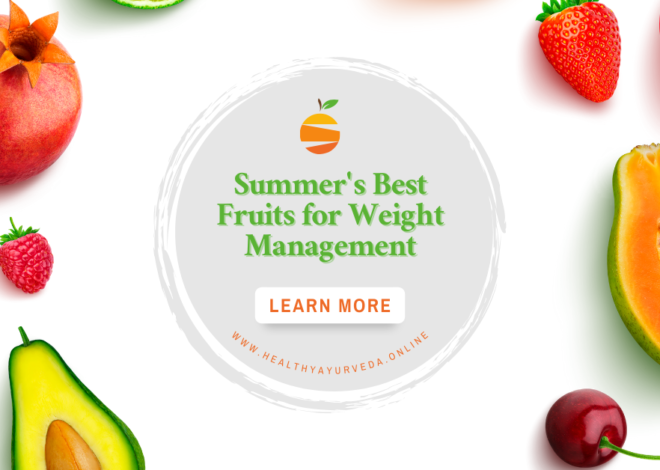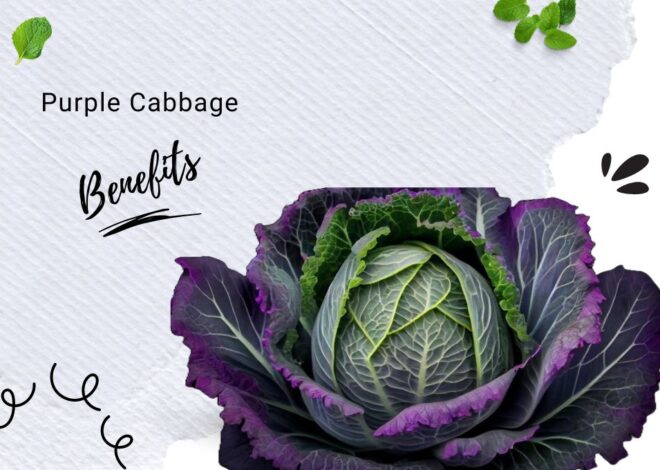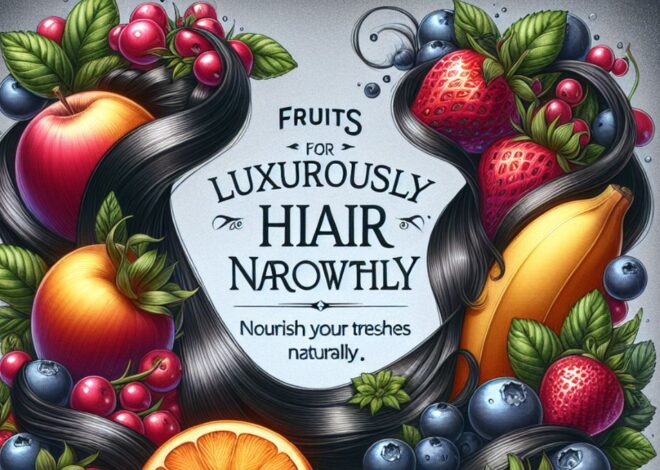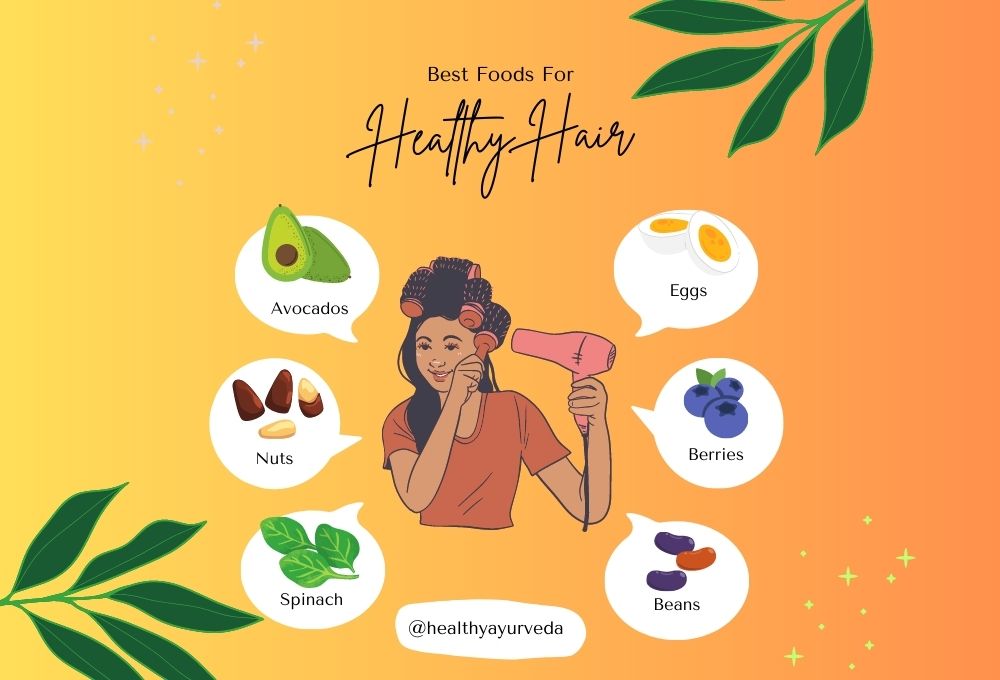
Top 10 foods to prevent hair loss
At some point in our lives, many of us will experience the distressing issue of hair loss. While it is a common occurrence, it doesn’t make it any less disheartening. The good news is that there are steps we can take to prevent or minimize hair loss, and one crucial aspect lies in our diet.
By incorporating certain foods into our daily meals, we can nourish our hair and promote healthy growth. In this comprehensive guide, we will explore the top 10 foods that have shown promising results in preventing hair loss and maintaining luscious locks.
1. Salmon: The Omega-3 Powerhouse

When it comes to combating hair loss and promoting healthy hair growth, the importance of a well-balanced diet cannot be overstated. Among the many nutritious foods available, salmon stands out as a true omega-3 powerhouse that can significantly contribute to maintaining luscious locks. In this article, we will delve into the remarkable benefits of salmon for preventing hair loss and explore why it deserves a place in your diet.
The Omega-3 Connection
Salmon, a fatty fish found in both saltwater and freshwater, is renowned for its rich omega-3 fatty acid content. These essential fatty acids, including EPA (eicosapentaenoic acid) and DHA (docosahexaenoic acid), play a crucial role in promoting hair health. Omega-3s are not only beneficial for overall well-being but have also been linked to reduced inflammation, improved heart health, and, importantly, hair growth and thickness.
Nourishing Hair Follicles –
The health of our hair follicles directly impacts the quality and strength of our hair. Omega-3 fatty acids, such as those found in salmon, provide vital nourishment to the hair follicles. They support the production of natural oils that keep the scalp moisturized, preventing dryness and flakiness, which can contribute to hair loss.
Reducing Inflammation –
Inflammation has been identified as a contributing factor to hair loss. The anti-inflammatory properties of omega-3s help combat inflammation in the body, including the scalp. By reducing inflammation, salmon promotes a healthier scalp environment, allowing for optimal hair growth.
Strengthening Hair Strands –
Weak, brittle hair is more prone to breakage and thinning. The proteins present in salmon help strengthen the hair strands, making them more resilient and less susceptible to damage. Incorporating salmon into your diet can contribute to stronger, healthier hair.
Enhancing Blood Circulation –
A healthy scalp relies on proper blood circulation to deliver essential nutrients and oxygen to the hair follicles. Omega-3 fatty acids, such as those found in salmon, help improve blood flow, ensuring that the hair follicles receive the nourishment they need to thrive. This enhanced circulation can lead to improved hair growth and a reduced risk of hair loss.
Other Nutrients in Salmon –
Aside from its omega-3 content, salmon is a rich source of several other nutrients beneficial for hair health. It is packed with high-quality proteins, which are the building blocks of hair. Proteins provide the necessary amino acids that support the structure and growth of hair strands.
Salmon also contains vitamin D, which plays a crucial role in hair follicle cycling and overall hair health. Adequate vitamin D levels have been associated with reduced hair loss and improved hair density.
Additionally, salmon is a good source of B vitamins, including niacin, B6, and B12, which are essential for maintaining healthy hair and scalp. These vitamins support the production of red blood cells, which carry oxygen and nutrients to the hair follicles.
Incorporating Salmon into Your Diet –
Now that you understand the remarkable benefits of salmon for preventing hair loss, you may be wondering how to include it in your diet. Here are a few delicious and nutritious ways to enjoy this omega-3 powerhouse:
Grilled Salmon: Season a fresh salmon fillet with herbs and spices, then grill it to perfection. This simple yet flavorful dish can be a centrepiece in a healthy meal.
Baked Salmon: Marinate a salmon fillet in your favourite marinade, then bake it in the oven until tender and flaky. Serve it alongside steamed vegetables for a well-rounded meal.
Salmon Salad: Combine cooked, cooled salmon with fresh salad greens, cherry tomatoes, cucumber, and your choice of dressing. This refreshing salad provides a delightful balance of flavours.
Remember to choose wild-caught salmon whenever possible, as it tends to have a higher omega-3 content compared to farmed salmon. Aim to incorporate salmon into your diet at least twice a week to reap its hair-boosting benefits.
2. Spinach: A Green Leafy Wonder
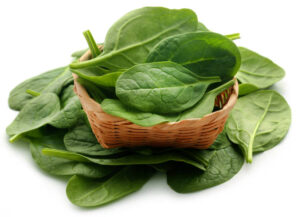
- Spinach is indeed a nutritious leafy green vegetable that offers numerous health benefits, but its ability to prevent hair loss is not scientifically proven. While spinach contains essential nutrients that contribute to overall hair health, such as iron, vitamin A, vitamin C, and folate, hair loss can be caused by various factors, including genetics, hormonal imbalances, nutritional deficiencies, and certain medical conditions.
- However, incorporating spinach into a well-balanced diet can support overall hair health by providing vital nutrients. Iron is important for healthy hair growth and spinach is a good source of this mineral. Iron deficiency can lead to hair loss, so consuming foods rich in iron, like spinach, may help prevent iron-related hair loss.
- Additionally, vitamin A plays a role in promoting a healthy scalp, and vitamin C aids in collagen production, which is essential for strong and healthy hair. Spinach contains both of these vitamins, making it a beneficial addition to a hair-friendly diet.
- While spinach can be a valuable part of a nutritious diet that supports overall hair health, it’s important to remember that individual results may vary, and hair loss can have underlying causes that require medical attention.
- If you are experiencing significant hair loss or are concerned about your hair health, it’s advisable to consult a healthcare professional or a dermatologist for a proper diagnosis and appropriate treatment options.
3. Eggs: A Protein Powerhouse
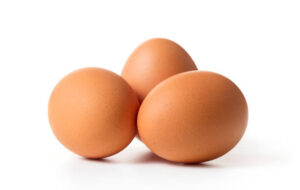
- Eggs are indeed considered a protein powerhouse and can play a role in promoting healthy hair. Hair is primarily composed of a protein called keratin, and consuming an adequate amount of protein is essential for hair growth and strength. Eggs are a great source of high-quality protein, making them beneficial for maintaining healthy hair.
- Protein provides the building blocks for hair growth and helps strengthen the hair follicles. Additionally, eggs contain biotin, which is a B vitamin known for its role in promoting healthy hair and nails. Biotin deficiency can contribute to hair loss, so ensuring an adequate intake of this vitamin is important.
- Moreover, eggs are rich in other hair-friendly nutrients such as vitamins A and E, iron, selenium, and zinc. These nutrients help nourish the scalp, promote healthy circulation, and support hair growth. Vitamin A helps in the production of sebum, which moisturizes the scalp and keeps hair strands healthy.
- Vitamin E is an antioxidant that can help protect the hair follicles from oxidative stress. Iron is essential for delivering oxygen to the hair follicles, while selenium and zinc play a role in maintaining scalp health.
- To benefit from eggs as a protein powerhouse for hair health, it is recommended to include them in a balanced diet along with other nutritious foods. Remember that diet alone may not be the only factor contributing to hair loss or hair health. Factors such as genetics, overall health, and hair care practices also play a significant role. If you’re experiencing excessive hair loss or other hair-related concerns, it’s always advisable to consult with a healthcare professional or a dermatologist for a comprehensive evaluation and personalized advice.
4. Greek Yogurt: Boosting Hair Strength
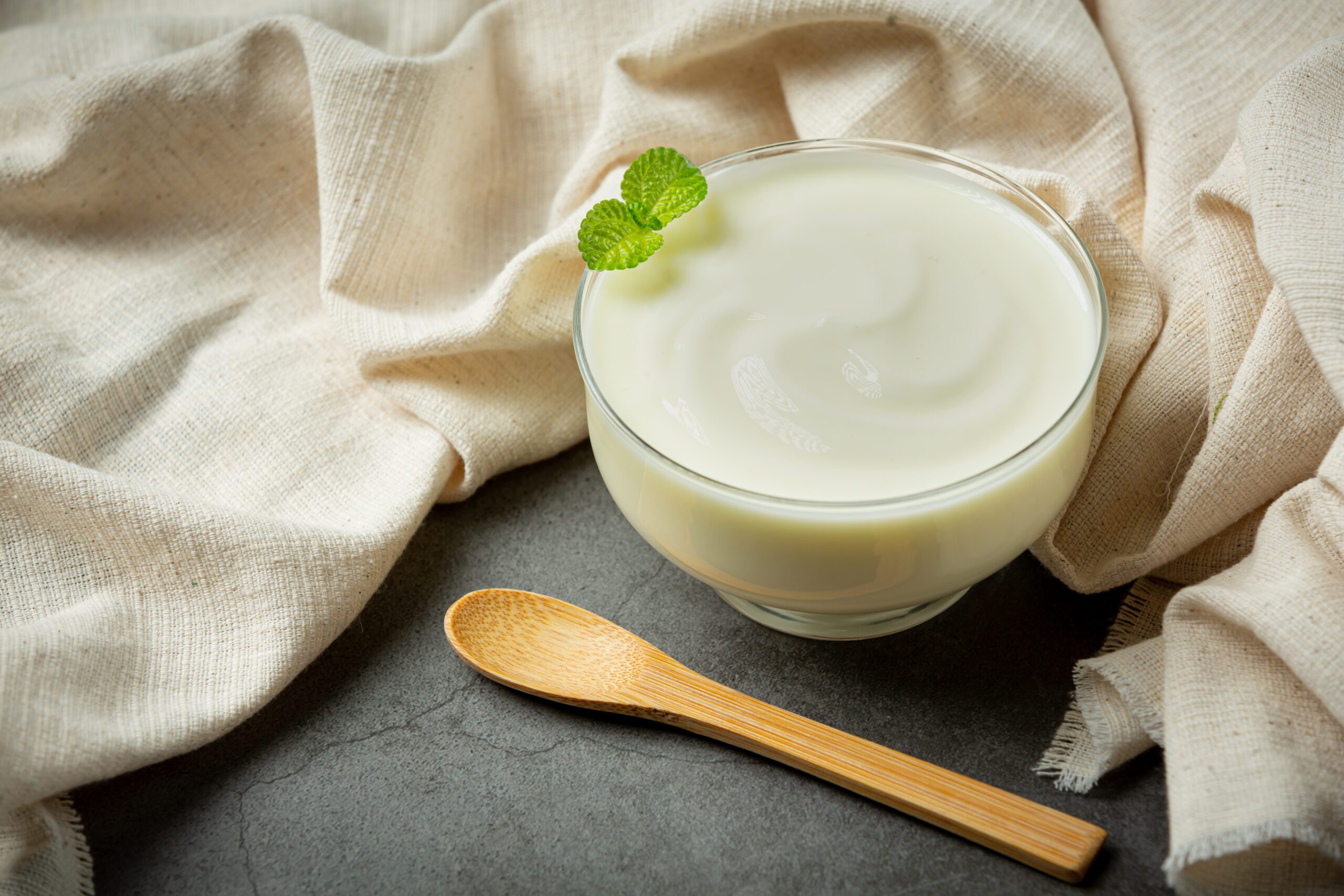
- Greek yoghurt is considered a beneficial food for boosting hair strength and potentially preventing hair loss. It is rich in protein, vitamins, and minerals that can promote healthy hair growth.
- Protein is a crucial component of hair structure, and Greek yoghurt is an excellent source of high-quality protein. Consuming an adequate amount of protein helps provide the building blocks necessary for hair growth and strength.
- Greek yoghurt also contains vitamin B5 (pantothenic acid), which is known to nourish and strengthen hair follicles. This vitamin helps improve blood flow to the scalp and promotes healthy hair growth.
- Furthermore, Greek yoghurt is a good source of vitamin D, which plays a role in hair follicle cycling. Adequate vitamin D levels have been associated with healthy hair growth.
- The presence of calcium in Greek yoghurt is beneficial for hair health as well. Calcium is involved in hair cell growth and differentiation, and it contributes to strong and healthy hair.
- To include Greek yoghurt in your diet to boost hair strength, you can enjoy it as a snack, incorporate it into smoothies, or use it as a topping for various dishes. However, it’s important to note that while Greek yoghurt can contribute to hair health, it’s not a guaranteed solution for preventing hair loss or addressing all hair-related issues.
- A balanced diet, along with proper hair care and overall health, is essential for maintaining healthy hair. If you have concerns about hair loss or other hair-related problems, it’s best to consult with a healthcare professional or a dermatologist for personalized advice.
5. Nuts and Seeds: Nature’s Hair-Restorers
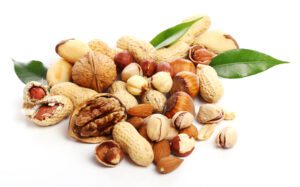
- Nuts and seeds are often considered nature’s hair restorers and can be beneficial in preventing hair loss. They are packed with essential nutrients that support healthy hair growth and nourish the scalp.
- Nuts, such as almonds, walnuts, and cashews, are rich in omega-3 fatty acids, vitamin E, and biotin. Omega-3 fatty acids help reduce inflammation in the scalp, promoting a healthy environment for hair growth. Vitamin E is an antioxidant that improves blood circulation in the scalp and helps repair damaged hair follicles. Biotin, also known as vitamin B7, plays a crucial role in the production of keratin, the protein that forms the structure of hair strands.
- Seeds, like flaxseeds, chia seeds, and pumpkin seeds, are excellent sources of omega-3 fatty acids, vitamin E, and zinc. Zinc helps maintain a healthy scalp and supports hair follicle strength. Additionally, seeds are rich in antioxidants that protect hair follicles from oxidative stress and damage.
- Including a variety of nuts and seeds in your diet can provide a wide range of nutrients necessary for healthy hair growth. You can enjoy them as a snack, sprinkle them on salads or yoghurt, or incorporate them into homemade granola or baked goods.
- However, it’s important to note that while nuts and seeds can contribute to hair health, they are just one piece of the puzzle. A well-rounded diet, along with proper hair care and overall health, is crucial for maintaining healthy hair. If you have concerns about hair loss or other hair-related issues, it’s always advisable to consult with a healthcare professional or a dermatologist for personalized advice.
6. Sweet Potatoes: The Beta-Carotene Boost
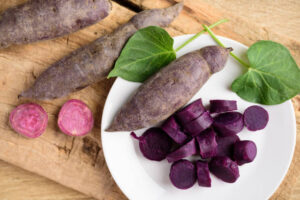
Sweet potatoes are an excellent food choice for boosting hair health and potentially preventing hair loss. They are rich in beta-carotene, a precursor to vitamin A, which is essential for promoting a healthy scalp and strong hair.
Beta-carotene is converted to vitamin A in the body, and this vitamin plays a crucial role in maintaining the health of hair follicles. It helps in the production of sebum, which is the natural oil that keeps the scalp moisturized and nourishes the hair strands. Adequate sebum production ensures that the hair remains healthy, moisturized, and less prone to breakage.
Additionally, vitamin A supports the growth and development of all body cells, including hair cells. It helps in the production of keratin, which is a protein that forms the structural component of hair. Strong and resilient hair strands are less likely to experience excessive hair loss.
Including sweet potatoes in your diet provides a significant beta-carotene boost, which contributes to maintaining a healthy scalp and promoting hair growth. They can be enjoyed in various ways, such as baked, mashed, or roasted. Combining them with a source of healthy fat, like a drizzle of olive oil or a sprinkle of nuts, can further enhance the absorption of beta-carotene.
While sweet potatoes can be beneficial for hair health, it’s important to remember that a balanced diet and overall healthy lifestyle are key factors in preventing hair loss. If you have specific concerns about hair loss or other hair-related issues, it’s advisable to consult with a healthcare professional or a dermatologist for personalized advice.
7. Oysters: Zinc-Rich Delicacies
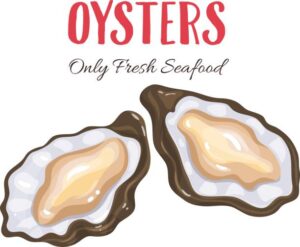
- Oysters are considered a delicacy that is rich in zinc, and they can be beneficial in preventing hair loss and promoting healthy hair growth.
- Zinc is an essential mineral that plays a vital role in various biological processes, including hair growth and scalp health. It is involved in the production of new cells, including the cells responsible for hair growth. Zinc also helps maintain the oil-secreting glands on the scalp, which are crucial for keeping the hair follicles healthy and moisturized.
- A zinc deficiency has been linked to hair loss and scalp conditions like dandruff. Including zinc-rich foods like oysters in your diet can help ensure an adequate intake of this mineral, supporting the overall health of your hair.
- In addition to zinc, oysters are a good source of protein, iron, and other minerals that contribute to hair health. Protein is essential for the structure of hair strands, while iron helps deliver oxygen to the hair follicles, promoting their growth and strength.
- It’s worth noting that oysters may not be suitable for everyone, especially those with shellfish allergies or dietary restrictions. If you are unable to consume oysters, there are other food sources of zinc, such as lean meats, legumes, nuts, and seeds, that can be included in your diet to help maintain healthy hair.
- Remember that while incorporating zinc-rich foods like oysters into your diet can contribute to hair health, it’s important to maintain a balanced diet and consider other factors that can affect hair loss, such as genetics, overall health, and hair care practices. If you have concerns about hair loss or other hair-related issues, consulting with a healthcare professional or a dermatologist is recommended for personalized advice.
8. Blueberries: Antioxidant Powerhouses
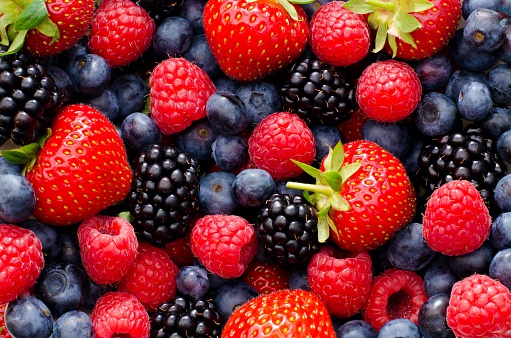
- Blueberries are often considered antioxidant powerhouses and can be beneficial in preventing hair loss and promoting healthy hair growth.
- Antioxidants are compounds that help protect the body’s cells, including those in the scalp and hair follicles, from damage caused by free radicals. Free radicals are unstable molecules that can lead to oxidative stress, which is associated with hair ageing and hair loss.
- Blueberries are rich in antioxidants, particularly vitamin C and various types of phytochemicals, such as anthocyanins. These antioxidants help neutralize free radicals and reduce oxidative stress, promoting a healthy scalp environment and supporting hair growth.
- Furthermore, blueberries contain vitamins A and E, which are also potent antioxidants. Vitamin A helps maintain the health of the scalp and supports the production of sebum, which moisturizes and nourishes the hair. Vitamin E contributes to improved blood circulation in the scalp and helps protect the hair follicles from oxidative damage.
- Including blueberries in your diet provides a delicious and nutritious way to incorporate antioxidants into your routine. You can enjoy them as a snack, add them to smoothies or yoghurt, or use them as a topping for cereals and salads.
- While blueberries can be beneficial for hair health, it’s important to remember that they are just one component of a balanced diet and a comprehensive approach to hair care. If you have specific concerns about hair loss or other hair-related issues, it’s advisable to consult with a healthcare professional or a dermatologist for personalized advice.
9. Lentils: Protein and Iron Combo
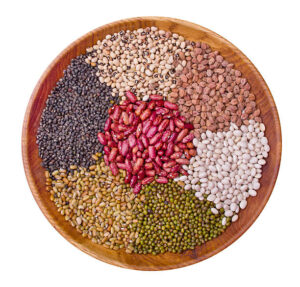
- There is some evidence to suggest that lentils can contribute to healthy hair due to their protein and iron content. Protein is essential for hair growth as hair strands are primarily composed of a protein called keratin. Consuming an adequate amount of protein in your diet helps support the growth and strength of your hair.
- Iron is another important nutrient for hair health. Iron deficiency can lead to anaemia, which is associated with hair loss. Iron helps in the production of haemoglobin, a protein that carries oxygen to the cells, including the hair follicles. When the hair follicles do not receive sufficient oxygen and nutrients, hair growth can be affected, resulting in hair loss.
- Lentils are a good source of both protein and iron, making them a valuable addition to a balanced diet aimed at promoting healthy hair. However, it’s important to note that hair loss can be caused by various factors, including genetics, hormonal changes, nutritional deficiencies, and medical conditions.
- While lentils can be beneficial for hair health, they should be part of a comprehensive approach that includes overall nutrition and addressing any underlying causes of hair loss.
- If you’re experiencing significant hair loss or are concerned about your hair health, it’s always best to consult with a healthcare professional or a qualified dietitian who can provide personalized advice based on your specific needs and circumstances.
10. Avocado: Healthy Fats for Healthy Hair
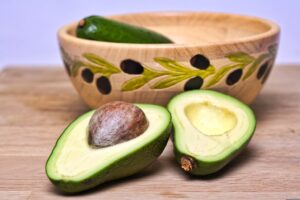
- Avocado is often praised for its numerous health benefits, including its potential impact on hair health. One of the key reasons why avocado is considered beneficial for hair is its high content of healthy fats. These fats, such as monounsaturated fats, are important for overall health and can play a role in maintaining healthy hair.
- Hair strands require a sufficient amount of moisture to stay strong and flexible. The monounsaturated fats found in avocados help to moisturize the scalp and hair strands, preventing dryness and promoting overall hair health. This can be particularly beneficial in reducing hair breakage and preventing split ends.
- Furthermore, the healthy fats in avocados can aid in the absorption of fat-soluble vitamins, such as vitamins A, D, E, and K. These vitamins are essential for maintaining healthy hair follicles and promoting hair growth. By consuming avocados, you can enhance the absorption of these vitamins from other foods, thereby supporting healthy hair growth.
- However, it’s important to note that while avocados can contribute to overall hair health, they may not be a standalone solution for preventing hair loss. Hair loss can have various causes, including genetic factors, hormonal imbalances, nutrient deficiencies, and underlying medical conditions. It’s important to maintain a balanced diet, address any nutritional deficiencies, and seek professional advice if you are experiencing significant hair loss or concerns about your hair health.
- Incorporating avocados into a well-rounded diet that includes a variety of nutrient-dense foods can be a positive step toward promoting healthy hair, but it should be part of a comprehensive approach to hair care.
Conclusion-:
Incorporating the top 10 foods mentioned above into your daily diet can significantly contribute to preventing hair loss and promoting healthy hair growth. Remember that a well-balanced diet, coupled with a healthy lifestyle, can have a positive impact on your hair’s overall health. So, why not embark on a culinary journey that nourishes not just your taste buds but also your precious locks?

